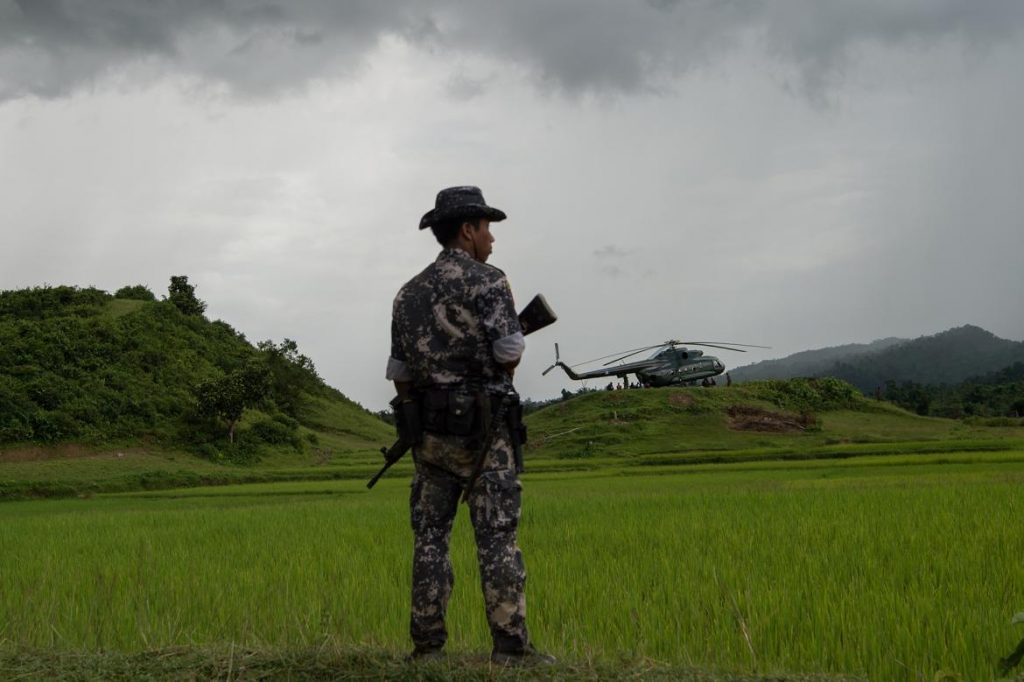By OLIVER SLOW | FRONTIER
YANGON — Myanmar’s military has released a report denying allegations that its personnel committed any wrongdoing in the security clearance operations conducted in northern Rakhine State in recent months.
A statement was posted to the Facebook page of the military’s commander-in-chief Monday, saying that an investigation by the Tatmadaw True News Information Team had found “there was no death of innocent people” during the operations, which were conducted in the aftermath of the August 25 attacks by fighters from the Arakan Rohingya Salvation Army.
The violence has led to more than 600,000 people – overwhelmingly Muslims who identify as Rohingya – fleeing over the border into Bangladesh. Many have arrived with harrowing accounts, accusing the military of arson, mass rape and extrajudicial killing.
But the military – supported by the civilian government – has continuously denied the accusations. In June, Myanmar’s government said it would deny visas to members of a United Nations team tasked with investigating the human rights situation in the country, prior to the latest round of violence.
Support more independent journalism like this. Sign up to be a Frontier member.
Observers have called on the government to allow an independent team to conduct investigations on the ground.
Monday’s statement said that the investigation was headed by the Inspector General of the Defence Services, Lieutenant-General Aye Win and involved interviews with more than 3,000 villagers in northern Rakhine, including 2,817 “Bengalis”, a term the military, and much of Myanmar’s population, uses to describe the Muslim minority.
“They [security forces] did not commit shooting at innocent villagers and sexual violence and rape cases against women. They did not arrest, beat and kill the villagers,” the statement said. “They did not totally destroy, rob and take property, gold and silver wares, vehicles and animals of villagers from the villages and displaced villages. They did not set fire to the mosques in Bengali villages. They allow (sic) the Bengali villagers to perform their faiths in freedom without banning them to attend the mosques and join prayers.”
The statement added that all security members were following the orders of “superior bodies”, especially in rules relating to the rights of self-defence and in conducting anti-terrorist operations. Immediately after the August 25 attacks, Myanmar’s government declared ARSA a terrorist organisation.
It said that in 94 clashes between August 25 and September 5, 376 alleged ARSA members were killed and 78 were arrested. The government’s death toll from the fighting was 13, with 15 injured and one missing.
The statement came in for criticism from several quarters.
Dutch diplomat Ms Laetitia van den Assum, a former of the Advisory Commission on Rakhine State headed by former UN Secretary General Mr Kofi Annan which concluded its work in August, said that the report “reinforces the dire need for an independent and impartial investigation” into what happened in northern Rakhine, including listening to the more than 600,000 refugees who have fled to Bangladesh.
“There is a remarkable consistency in the testimony by refugees, and hospital records in Bangladesh indicate that a large number of them have presented bullet wounds and other serious injuries,” she told Frontier by email on Tuesday. “Credible reports on sexual violence indicate that many women suffered tremendously. This cannot just be ignored.”
Amnesty International also accused the Tatmadaw of attempting to sweep serious allegations of human rights abuses under the carpet.
“The Myanmar military has made it clear it has no intension of ensuring accountability,” said Mr James Gomez, Amnesty’s regional director for Southeast Asia and the Pacific. “It is now up to the international community to ensure these appalling abuses do not go unpunished.”







